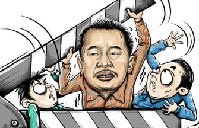However, in reality, power or money is often the biggest draw. Even when it is not stated, it is usually implied when one with these advantages courts someone or is courted by someone.
 |
 |
Then there is the school of people who believe that those in power should act as moral paragons. It is not that different from those in the US who wanted to impeach Bill Clinton from the presidency when he was found to have had a fling with an intern.
Did he dole out official favors such as contracts to her or change policies for her? It seemed not.
But he was not being a faithful husband. Suffice to say, those who did not care whether it interfered with his job tended to view it from a moral standpoint.
The same is true in China where morality itself, or rather the lowering of it, could be the offense.
Technically, if you are a Communist Party member, you are also constrained by Party doctrines, which could include clauses on morality.
But legally, everyone is entitled to the right of privacy, and that may include things like adultery unless it is proven that it is connected to other wrongdoings.
Highlighting the number of illicit affairs is seen as the surest way to topple someone from even the highest pedestal. It proves beyond doubt that the person is degenerate.
The Chinese equivalent of Don Juan is Ximen Qing, a fictional character in two classic novels. A shrewd businessman, he is also a pathological womanizer and a sex addict.
In the books he is depicted as having eight wives and concubines and more than a dozen lovers. Unlike one of the women he married who has been given a feminist twist in the past century, Ximen is perceived as having no redeeming value whatsoever.
It can backfire when hanging out the dirty laundry takes the place of highlighting the infringement on public interests. Some may deduce that the offender did not commit much of a real crime since the adultery he committed is played up so prominently.
The bigger picture is, people are increasingly able to distinguish matters of private concerns and public realm.
Culturally, China is more tolerant of adultery than, say, the United States. Even though we have horror stories from the past in which adulterers were condemned to death, many couples now adopt a forgiving view when the dalliance ends with no noticeable ramifications. They would place the family and children above the purity of their relationship. As Jackie Chan famously said: "It is a mistake all men are prone to."
In the US, at least as portrayed in Hollywood films, the wife would immediately demand a divorce once the secret liaison comes to light. There seems to be little room for reconciliation, and if the woman does back down, it would be seen as a loss of self-respect.
In Chinese movies, the wife shows her wisdom by playing calm and getting rid of her threat without making a scene.
I'm sure sociologists may trace the difference to male domination in Chinese tradition and the puritanical heritage of American society.
But as Leo Tolstoy wrote in the opening of Anna Karenina, his epic on infidelity: "Every unhappy family is unhappy in its own way."